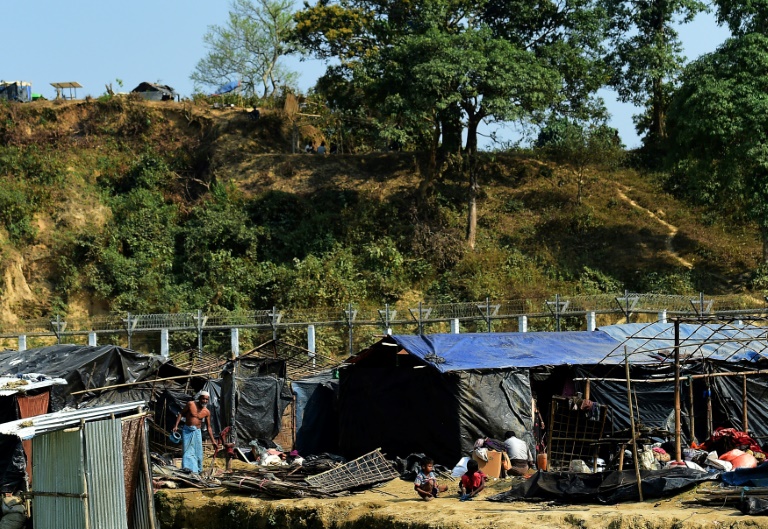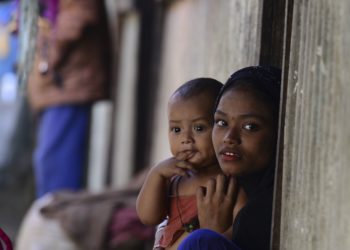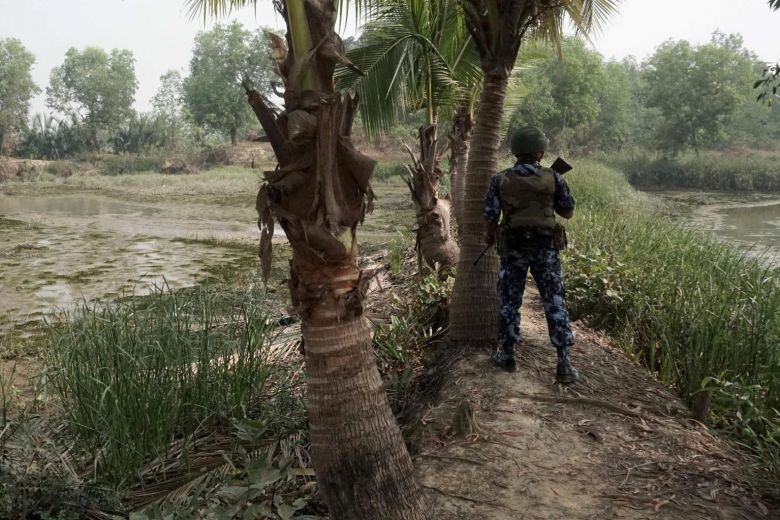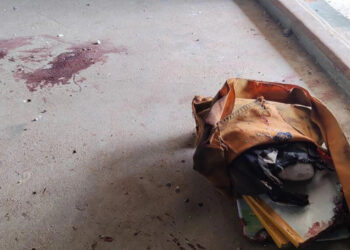More than 3,200 people were displaced last week in Myanmar following intensified fighting between the Arakan Army rebel group and the Myanmar Military in the northern Mrauk-U Township. With nine Myanmar police officers confirmed dead, and eleven more still held-prisoner, this latest clash with the Burmese military signals continued strife for stabilizing Myanmar’s poorest region, sitting at a 78 percent poverty rate.
Recent swells in violence between the Arakan Army, aligned with Rakhine’s Buddhist population, and the Burmese government have stalled the repatriation of the Rohingya, the Rakhine State Muslim minority, from returning from Bangladesh.
The Rohingya, called “the world most persecuted minority,” have faced a long history of tension with the Myanmar government themselves, reaching new urgency last August following a violent retaliation of Myanmar security forces to a small Rohingya insurgent attack. Doctors Without Borders estimates that between August 25th and September 24th, 2018 alone, over 9,000 Rohingya were brutally killed.
As UNHCR spokesperson Andrej Mahecic said the agency “does not believe that conditions are currently in place in Myanmar for voluntary, safe, dignified, and sustainable return of Rohingya refugees.”
An estimated 740,000 Rohingya people currently reside in camps along the Myanmar-Bangladesh border, and fears of similar Rohingya-directed attacks with the Burmese military have caused many refugees to express that they “would rather die” than return to Myanmar even if the violence subsided.
@UNICEFChief recently visited the world’s largest refugee camp in Bangladesh. It is home to a million Rohingya refugees from Myanmar – more than half are children.#ChildrenUnderAttack pic.twitter.com/ZDO8Mc5Ntq
— UNICEF (@UNICEF) March 16, 2019
Labeling the Conflict
Since then, the U.N. has labeled the violence in Rakhine State, “the world’s fastest growing refugee crisis,” with estimates of over 740,000 displaced Rohingya now living in Bangladesh and other neighboring countries.
The U.N. has raised the military offensive perpetrated by the Burmese government as a possible case of genocide, crimes against humanity, and according to U.N. High Commissioner for Human Rights, Zeid Raad al-Hussein, a textbook example of ethnic cleansing.”
Chris Wilson, an expert on ethnic conflict at the University of Auckland, told The Globe Post there is “substantial evidence that the campaign was genocidal.” He explained how “genocide requires the intent to destroy a group in whole or in part. The campaign seems to have been designed to eliminate at least part of the Rohingya (those in northern Rakhine State).”
Citing key political actors including the U.S. House of Representatives, U.S. Holocaust Memorial Memorial, and U.N. as supporters of this designation, Wilson argued that the situation is dire, despite an international response he deemed “very slow.”
Cresa Pugh, a Harvard scholar who recently conducted fieldwork in Rakhine state, told The Globe Post that it is necessary to understand the context of the campaigns, cautioning the international community and the media from responding to the humanitarian concerns in a vacuum.
Pugh said that “violence against Muslims in Myanmar dates back to the colonial period when Muslim immigrant laborers and merchants from what was then British India faced significant discrimination and hostility due to mounting economic competition.”
Citing four large military campaigns against the Rohingya, she expressed how “the most recent iteration of violence is unique in scale and scope–being the largest single mass exodus of the population in its history – but the violence and terror that underpins this moment is nothing new.”
Despite continued violence and widespread condemnation of the humanitarian concerns affecting the Rohingya people, insufficient aid and the challenges to prosecuting the Myanmar government for their actions challenge peacekeeping efforts.
For Rohingya, Bangladesh’s Bhashan Char ‘Will Be Like a Prison’ https://t.co/QX7qPSWq4n
— Human Rights Watch (@hrw) March 15, 2019
Responses
This week, the U.N. Human Rights Council has published a report detailing 402 recommendations for immediate action to be taken in Myanmar regarding the human rights concerns currently facing the Rakhine State in five key thematic areas: citizenship; participation in public life; fundamental rights and freedoms; displacement and the right to return; and accountability for human rights violations. With little progress towards these goals over the past year and a half, the U.N. High Commissioner has placed particular emphasis on expedient compliance with international human rights obligations.
Following a visit to Bangladesh’s Cox’s Bazar district, home to around one million Rohingya refugees, International Criminal Court officials concluded that their delegation had adequate grounds to pursue prosecution for “crimes against humanity.”
Yet, the main roadblock to legal intervention remains the complexities of the jurisdiction of the International Criminal Court. As a non-member to the ICC Tribunal, Myanmar’s state counselor, Aung San Suu Kyi, has been an outspoken critic of legal prosecution, calling ICC procedures “contrived,” and at the will of “the political current of the times.”
ICC’s delegation has ignored her rebuke, citing Bangladesh’s participation as a State Party to the Statute, and the fact that over 740,000 Rohingya people are currently displaced there as evidence of their jurisdiction.
But Abdur Rahim, a peace advocate based in Cox’s Bazar, Bangladesh, was told by ICC investigators that the judicial process “would be lengthy,” creating an unknown timeline for legal action against the Myanmar military.
To respond to the surmounting humanitarian needs on the ground at present, the United Nations has also adopted the the Joint Response Plan for 2019— with $920 million in appeals. Half of the funding will be allocated towards services deemed “critical aids” such as food, water, sanitation, and shelter. Additional funding will be used towards health, site management, and addressing sexual and gender-based violence, education, and nutrition. The 2018 Joint Resolution Plan was 69 percent funded, garnering $655 million of the $950 million requested, so full funding for 2019 remains a challenge.
Pugh said, “the international community – including nearby countries such as Malaysia, Indonesia, and Thailand – as well as European and North American countries – must step up their commitment to providing asylum and supporting relocation efforts for refugees.”
She emphasized the significant responsiveness by the the government of Bangladesh over the last 18 months, but that the international community cannot rely on them solely for the full scope of needs due to their limited resources.
And with a decision this week by The Government of Bangladesh to move forward on a plan to relocate up to 100,000 Rohingya to a remote island next month off the Bay of Bengal, many human rights groups including Amnesty International have cited additional concerns for the fate of the Rohingya people, including insufficient infrastructure and topography. A top U.N. Official has cautioned that this decision could spark “a new crisis,” for the Rohingya, despite urging by the Bangladesh government that any Rohingya relocated to the island would be done voluntarily.
Even if this plan stalls due to the human rights concerns at stake, the deep political tension between the Rohingyas, the Burmese authorities, and now the Bangladesh government poses substantial challenges to long-term cooperation and peacebuilding for Rohingya autonomy.
And as Wilson said, “the pressure on Myanmar has been minimal and little has been done (yet) to punish the generals and civilians involved in the campaign. This may change with the potential ICC investigation.”




















